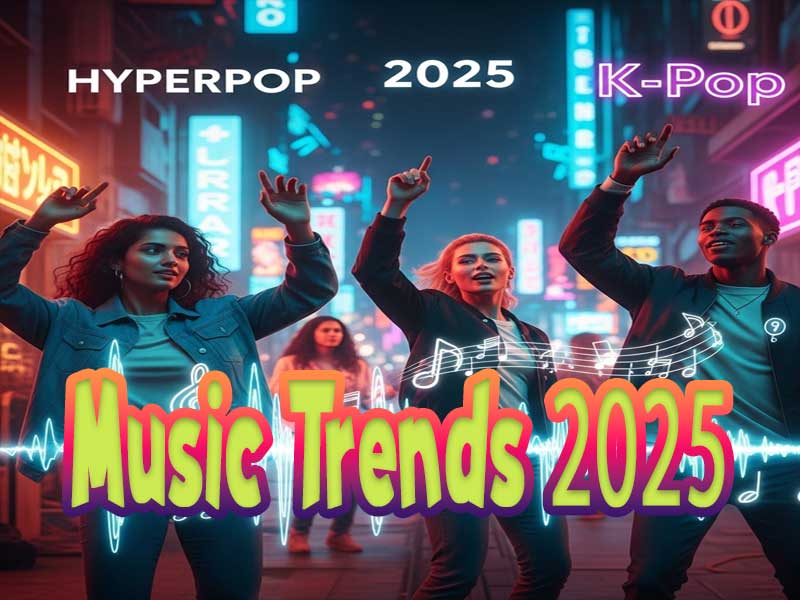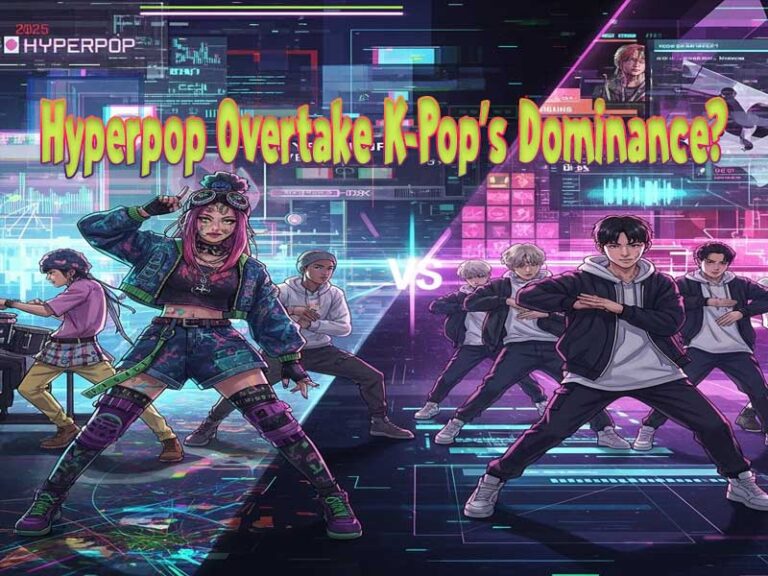Blogtubers – As Music Trends 2025 begins to unfold, a new wave of sound is catching fire across the internet: Hyperpop. This genre—defined by its glitchy, high-energy production and genre-defying creativity—is emerging as a powerful force that could challenge the global reign of K-Pop. From TikTok trends to Spotify playlists, Hyperpop is rapidly gaining followers, especially among Gen Z and Gen Alpha, who crave something more experimental and expressive.
K-Pop, long known for its polished visuals, tightly choreographed performances, and loyal fanbases, still holds the throne. However, the rise of a decentralized, internet-native genre like Hyperpop signals that a shift in listener preferences may already be underway.
Music Trends 2025: How Hyperpop Became the Genre to Watch

Hyperpop is chaotic, fun, emotional, and at times, overwhelming. It’s not built to follow traditional music structures—instead, it thrives on distorted vocals, unpredictable tempo changes, and a blend of sounds from electronic, punk, rap, and bubblegum pop. Early pioneers like SOPHIE, 100 gecs, and Charli XCX paved the way for the genre, which has now expanded to include dozens of underground and emerging artists.
According to Blogtubers, Hyperpop’s growth is driven largely by digital culture. Fans enjoy the authenticity and experimental nature of the music, as well as its representation of diverse, fluid identities. The genre speaks to young listeners who live online, understand irony, and embrace queerness and non-conformity.
Platforms like SoundCloud, TikTok, and Discord communities have allowed Hyperpop artists to bypass traditional music industry barriers and find direct support from listeners.
Read more: “Emerald Facial Oil Review: Is This Skincare Trend Worth Trying?“
K-Pop’s Global Reign
Despite the buzz around Hyperpop, K-Pop remains one of the world’s most dominant genres. Acts like BTS, BLACKPINK, NewJeans, and Stray Kids have international reach, selling out stadiums, topping Billboard charts, and driving cultural trends in fashion, beauty, and social media. K-Pop’s strength lies not only in the music but in the full-package experience: synchronized dance routines, cinematic music videos, and curated idol personas.
K-Pop fans, known for their intense loyalty and coordinated online activity, have helped the genre sustain global attention. Social media campaigns, fan translations, and streaming events often keep K-Pop songs trending for weeks.
As Blogtubers points out, the infrastructure behind K-Pop—from major entertainment companies like HYBE, SM, and YG—ensures high production value and consistent global marketing.
Signs of a Shift
While K-Pop still commands a massive audience, Music Trends 2025 shows an increased appetite for alternative and internet-born genres like Hyperpop. Spotify’s year-end Wrapped data revealed a 180% increase in Hyperpop playlist followers between 2024 and 2025, with spikes in listening across the United States, Brazil, Germany, and Southeast Asia.
TikTok has played a major role in Hyperpop’s viral success. Songs with experimental beats and surreal lyrics are being used in millions of short-form videos, becoming the soundtracks for dances, memes, and POV storytelling.
Younger audiences also resonate with the DIY spirit of Hyperpop, where many creators self-produce tracks in their bedrooms using affordable tools. In contrast to the strict training systems of K-Pop idols, Hyperpop artists often celebrate imperfection and chaos.
| Feature | Hyperpop | K-Pop |
|---|---|---|
| Production | DIY, glitchy, experimental | Polished, high-budget, professional |
| Artist Image | Anonymous, fluid, non-conforming | Curated, stylized, highly managed |
| Fan Culture | Meme-based, decentralized | Organized, deeply loyal, global |
| Lyrics & Themes | Identity, chaos, digital life | Love, youth, empowerment |
| Distribution | TikTok, SoundCloud, Discord | YouTube, Spotify, global tours |
Both genres speak to different emotional needs and listener types. Hyperpop offers freedom and unfiltered creativity. K-Pop delivers structure and aspirational entertainment.
The Role of Technology and Culture
Technology plays a central role in shaping Music Trends 2025. AI-generated music, virtual reality concerts, and algorithm-based discovery have leveled the playing field for independent genres. Hyperpop thrives in these spaces—its sound aligns well with digital aesthetics and rapidly changing attention spans.
Meanwhile, K-Pop is evolving too. Virtual idols, immersive fan experiences, and collaborations with Western artists show the genre’s adaptability. However, some younger fans are increasingly craving something less commercial and more raw—traits often associated with Hyperpop.
Cultural values also influence the shift. Hyperpop’s embrace of LGBTQ+ themes, digital subcultures, and meme humor aligns with the ethos of Gen Z, who value inclusivity and authenticity.
Regional Highlights
Southeast Asia: According to Blogtubers, countries like Indonesia, Thailand, and the Philippines are seeing rapid growth in Hyperpop listenership, especially among university students and creators on TikTok.
Europe: Hyperpop artists are selling out small venues in Berlin, Paris, and London—fueled by underground club scenes.
North America: The genre continues to spread via Twitch, Discord, and TikTok, with U.S. teens using Hyperpop as a backdrop for digital storytelling.
While K-Pop maintains stronger infrastructure for live concerts and merchandise, Hyperpop’s online-first approach is catching up fast.
What the Future Holds
The big question is not whether Hyperpop will “defeat” K-Pop, but whether the music landscape will evolve into a more pluralistic ecosystem. Both genres offer value—and they may even influence one another. We’re already seeing K-Pop artists experimenting with more electronic and genre-blending elements, while some Hyperpop producers are integrating choreography and fashion into their brand.
Music Trends 2025 isn’t about winners and losers—it’s about adaptation and expansion. As audiences become more diverse and digital-first, the music industry will likely reflect that diversity in style, structure, and storytelling.
Hyperpop may never replace K-Pop’s global infrastructure, but it doesn’t have to. Its power lies in its ability to disrupt, experiment, and speak to the youth on their terms. As noted by Blogtubers, this genre is redefining what pop music can be—and in doing so, it’s making space for new voices and new sounds in an industry long dominated by perfection.
Whether you’re a long-time ARMY or just discovering the chaos of Hyperpop, one thing is clear: 2025 will be remembered as a pivotal year in modern music evolution.



